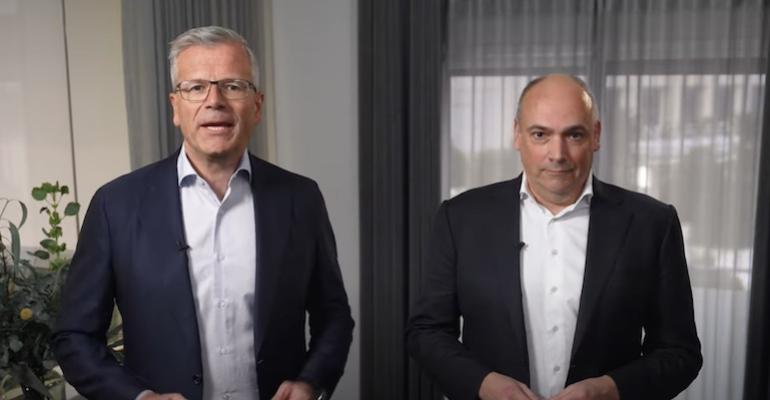Global Shippers’ Alliance (GSF) CEO James Hookham praised the move, while highlighting the glacial pace of change: “At last we have seen some innovation in the liner shipping industry,” he said, “they are offering something different in what is the first movement of the ‘ice flows’ since the first alliances were formed more than a decade ago.”
Hookham was keen on the schedule reliability, green ambitions and meeting contractual obligations, a particular difficulty that set carriers and shippers at loggerheads during the pandemic. Shippers are, in particular, very happy with the target of over 90% schedule reliability as a major boost for supply chains.
Shippers will be interested to hear Hapag-Lloyd CEO Rolf Habben Jansen confirm that the Gemini lines are looking to develop better communications with customers and that all contracts will be honoured, he added: “We will find solutions with customers but and we think this [90%+ reliability] is manageable.”
Vespucci Maritime’s Lars Jensen believes that this is key move: “It is a worthwhile ambition. And, in the past, we did at times see carriers on major routes deliver such reliability above 90%, hence if they operationally prioritise it, it is indeed feasible between main ports.”
Regionally Maersk and Hapag-Lloyd have looked to include the ports and terminals that they operate into their schedules so that the carriers can control the port-to-port operations.
Jansen specifically mentioned key regional hubs for Gemini services including Singapore and Tanjung Pelepas in Asia, Salalah and Damietta in the Middle East, Tangier and Algeciras in southern Europe, Rotterdam and Hamburg in Northern Europe and Lazaro and Cartegena in the Americas.
Gemini will cover seven trades: Asia - US West Coast; Asia - US East Coast; Asia - Middle East; Asia – Mediterranean; Asia - North Europe; Middle East – India and Europe and the Transatlantic.
Jansen added that Wilhelmshaven and Bremerhaven would likely be the major beneficiaries of an increase in freight which will be shuttled to secondary ports in Europe.
He said the schedule reliability will be enhanced by the carriers mainline services, “Only calling at two or three main ports, significantly lowering the risk of delay, while cargo for Antwerp, for example, will be transhipped at Tanger and a shuttle will deliver to Antwerp, the delivery time will be the same, but the larger ship will be able to turn around more quickly.”
Other developing regions such as Africa, will not be a part of the initial Gemini service offering, but Antonella Teodoro, MDS Transmodal’s senior consultant, believes: “Africa is definitely an attractive market for the new alliance - to add to the major markets they intend to cover.”
For Hookham the move emphasising customer service and customer care will need to be proven, “shippers will need to see how that manifests itself in practice,” following the debacle of the pandemic period, but it is a positive move for shippers.
In addition, large cargo owners will want to be able to communicate their green credentials to their customers and they will also be looking to see how the lines develop these lines of communication and how any savings are shared and will look to shipping lines to partner them in this regard.
Jansen added: “During the sustainable transition if our emissions fall and our carbon payments fall as a consequence the benefits will be shared with customers,” and that is in monetary terms and in reported emissions savings that customers can use to reduce their scope 3 emissions.
Both Hapag-Lloyd and Maersk had set carbon neutrality dates ahead of the IMO’s 2050 target, 2045 and 2040 respectively, and Lars Jensen points out that “They are the two most ambitious carriers out there on the green agenda.”
Emissions reduction will be key, but schedule reliability can also make for more efficient operations and to manage that the alliance will operate a hub and spoke operation linking ports in five regions, with 26 mainline services linked by 32 shuttle services that will serve second tier ports.
Copyright © 2024. All rights reserved. Seatrade, a trading name of Informa Markets (UK) Limited.
Add Seatrade Maritime News to your Google News feed.  |

